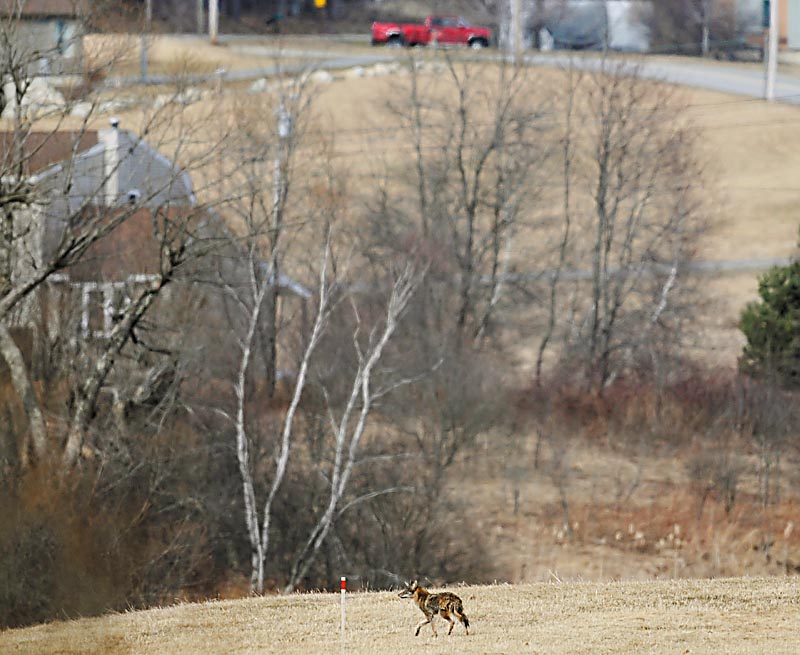AUGUSTA — Coyotes, unlike many other wild carnivores, can coexist in fairly close proximity with humans, according to a Maine conservation biologist working with a national advocacy group.
But well-meaning efforts to help coyotes or protect domestic animals from them often have the opposite effect, Geri Vistein said.
“Coyotes are very capable of coexisting with us,” Vistein said. “But we need to keep coyotes wild, by never providing them food, water or shelter.”
On the other hand, killing coyotes to protect farm animals can actually have the opposite result, she said.
Vistein, representing the national Coyote Project, spoke recently at Lithgow Public Library in Augusta.
Stable, healthy families of coyotes are likely to be wary of humans, she said, while wandering, unhealthy or starving coyotes are more likely to snag an unprotected chicken or other farm animal. Killing coyotes that have established territories opens those territories to wandering, dysfunctional coyotes, she said.
When coyotes are killed off, local populations respond by increasing birth rates, from three or four per year per female, to seven to 16 pups per year, Vistein said.
Good fencing, keeping a guard animal such as a llama or dog and keeping animals sheltered at night can help protect them from predators, Vistein said.
A healthy, stable coyote population can actually be beneficial by keeping down the population of rodents – their dominant food source, she said.
Coyotes have lived in North America for a half-million years, and exist nowhere else, she said.
There are about 19,000 coyotes in Maine during the fall, and the number drops to about 12,000 during an average winter, said biologist Wally Jakubas, mammal group leader for the state Department of Inland Fisheries and Wildlife.
Over the past 10 years, the number of coyotes tagged by hunters or trappers yearly has been declining, Jakubas said, but it is unclear whether populations are getting smaller, he said.
Coyotes can be hunted year-round during daylight hours in Maine. There is no limit on the number of animals a single hunter can kill.
Vistein said she could support regulated hunting, with bag limits and a set season.
Jakubas said there are no records of coyotes attacking people in Maine but people have been attacked in other states.
Usually, Jakubas said, attacks have involved food.
“Ninety-nine percent of encounters with coyotes will be nonconfrontational, and everything will be fine. They are fairly wary of us,” Jakubas said. “On the rare occasion, they may be aggressive. If you encounter a coyote, watch its behavior. Its normal behavior will be to identify you and, often, it runs off. If it becomes aggressive, treat it as you would an aggressive dog. Shout at it, don’t run away, and stand your ground.”
Send questions/comments to the editors.




Success. Please wait for the page to reload. If the page does not reload within 5 seconds, please refresh the page.
Enter your email and password to access comments.
Hi, to comment on stories you must . This profile is in addition to your subscription and website login.
Already have a commenting profile? .
Invalid username/password.
Please check your email to confirm and complete your registration.
Only subscribers are eligible to post comments. Please subscribe or login first for digital access. Here’s why.
Use the form below to reset your password. When you've submitted your account email, we will send an email with a reset code.